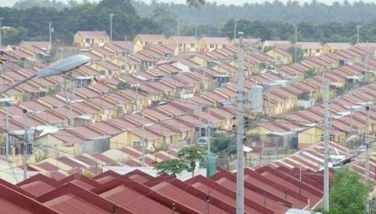‘Mahirap mahalin;’ body count continues

Every now and then, we come across statements of exasperation from Filipinos online. A sadly popular line is the one that goes: “Pilipinas ang hirap mong mahalin” or “Philippines you are so difficult to love.” More recently, I myself have discovered that “Mahirap din siyang tulungan” or “she is also hard to support or help.”
Take, for instance, the government’s “Bakuna Eskwela” program that was launched by no less than President Bongbong Marcos and rolled out by the Department of Health in cooperation with the Department of Education.
The program was meant to push government vaccination programs for school children, redeem the country’s stature in terms of addressing vaccine preventable diseases and stand strong against vaccine hesitancy and disinformation.
It was great that President Bongbong Marcos Jr. himself launched the program because I learned from a source that some DOH middle executives were hoping and praying that the media and other groups would help out. But except for some radio plugs and press releases, the PR for Bakuna Eskwela centered on the launch and no more.
Still, every doctor, public health advocate, hospital and health organization I knew expressed support not only for Bakuna Eskwela but also for the President’s bold stand on vaccination. In fact, within weeks of announcing the Bakuna Eskwela program, no less than the PAPO or Philippine Alliance of Patients Organization took the lead in issuing a statement of support for PBBM, Secretary Herbosa and the FDA.
That was followed by the Philippine Pediatric Society (PPS) and the Philippine Medical Association (PMA), both of whom addressed the importance of vaccination and addressing vaccine preventable diseases. All three organizations showed support for government as well as calling for a stop to disinformation regarding vaccines via social media.
This week, the PHAP or the Pharmaceutical and Healthcare Association of the Philippines is also expected to release their statement of support for the program and their call for the adoption of modern approaches and logistics in the management of health products such as vaccines.
But judging from what has been observed on the ground, the launch of the Bakuna Eskwela has not performed as expected and if not rescued with aggressive action, the program launch might become the beginning and the end of Bakuna Eskwela.
Figures indicate that program targets have not been met, supply chain issues have cropped up and the needed information campaign was overlooked or underestimated. There is even a claim that supplies are short or not immediately available due to last minute “orders” and issues regarding bidding procedures, volumes and prices that keep changing. Did they plan for an event but not for the program?
With such overwhelming display of support for PBBM, DOH and FDA coming from the private sector, you would think that the government officials involved would have reached out to the organizations and stakeholders in order to unify their stance, resources and plan of action.
Sadly, those behind Bakuna Eskwela were not “inclusive-minded” and carried on as government bureaucrats do. Aside from the lost opportunity, it showcases why people and organizations find it hard to help government. Mahirap ng mahalin, mas mahirap pang tulungan.
* * *
Since January 2024, 704 – yes, 704 – Filipinos have died from dengue.
That number will keep on increasing in the same way it has increased year to year. But it seems that for officials at the DOH and the FDA, the numbers are not alarming since they often say this year’s statistics or cases are “lower” compared to last year. FYI – those deaths could have been avoided!
Was it not President Bongbong Marcos who said that “one life is too high a price” during the last big typhoon? And yet with 704 people dead from dengue in 10 months, the DOH and the FDA can’t seem to work up enough political will to process and determine if the Philippines can finally have a new and, in the words of the DOH secretary, “a better dengue vaccine”
While the DOH has avoided or chose not to post statistics on monthly active cases of dengue and dengue-related mortality, they have recently advised the public to be vigilant and immediately seek medical attention if they have dengue.
Unfortunately, in spite of all the talk against vaccine hesitancy and disinformation, the truth is, in the Philippines, dengue has been, and continues to be, politicized even in public health policy practice.
Our health officials are so afraid of being targeted, bullied or accused by a small noisy lot of anti-vaxxers. Even worse, a couple of them are actively avoiding any possibility of triggering another “Dengvaxia-like controversy” that might affect the President’s popularity or ratings.
Or are they simply paranoid of losing their jobs to the point that rules and procedures as well as programs suffer delays, are toned down leading to poor dissemination of information, while scientific process drag on for years and government procedures take a back seat to “playing safe.”
While the DOH/FDA has over-extended and inexcusably delayed the processing of a new and different dengue vaccine called Qdenga, the World Health Organization, EU (2022) and several countries namely UK, Brazil, Argentina, Thailand, Indonesia and Vietnam have already approved its use.
After nearly two years, no one knows what the secretive FDA has done and how much longer before we know if the new and better dengue vaccine will actually be approved or not. In the meantime, the body count continues to increase.
- Latest
- Trending



























